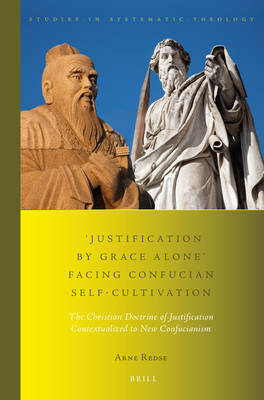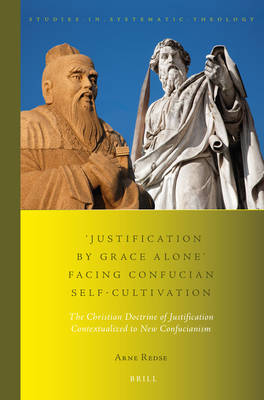
- Afhalen na 1 uur in een winkel met voorraad
- Gratis thuislevering in België vanaf € 30
- Ruim aanbod met 7 miljoen producten
- Afhalen na 1 uur in een winkel met voorraad
- Gratis thuislevering in België vanaf € 30
- Ruim aanbod met 7 miljoen producten
Zoeken
'Justification by Grace Alone' Facing Confucian Self-Cultivation
The Christian Doctrine of Justification Contextualized to New Confucianism
Arne Redse
€ 184,95
+ 369 punten
Omschrijving
Chinese contexts as influenced by the religious moral philosophy of New Confucianism are characterized by the idea of becoming a sage through self-cultivation. For Christian theology - with its emphasis on God's grace rather than on self-cultivation - Confucian teaching in this matter may appear as a problem.
Chinese Christian theology may ask: How can the Christian doctrine of justification by grace alone be contextualized in Chinese contexts which are characterized by the contradicting idea of self-cultivation? Another question may be equally interesting for Christian theology in all contexts: Which insights can be attained from an attempt at contextualizing the Christian doctrine of justification to contexts influenced by New Confucianism?
In this book professor Arne Redse contributes to answering these questions.
Chinese Christian theology may ask: How can the Christian doctrine of justification by grace alone be contextualized in Chinese contexts which are characterized by the contradicting idea of self-cultivation? Another question may be equally interesting for Christian theology in all contexts: Which insights can be attained from an attempt at contextualizing the Christian doctrine of justification to contexts influenced by New Confucianism?
In this book professor Arne Redse contributes to answering these questions.
Specificaties
Betrokkenen
- Auteur(s):
- Uitgeverij:
Inhoud
- Aantal bladzijden:
- 512
- Taal:
- Engels
- Reeks:
- Reeksnummer:
- nr. 18
Eigenschappen
- Productcode (EAN):
- 9789004302570
- Verschijningsdatum:
- 13/11/2015
- Uitvoering:
- Paperback
- Formaat:
- Trade paperback (VS)
- Afmetingen:
- 155 mm x 234 mm
- Gewicht:
- 703 g

Alleen bij Standaard Boekhandel
+ 369 punten op je klantenkaart van Standaard Boekhandel
Beoordelingen
We publiceren alleen reviews die voldoen aan de voorwaarden voor reviews. Bekijk onze voorwaarden voor reviews.








